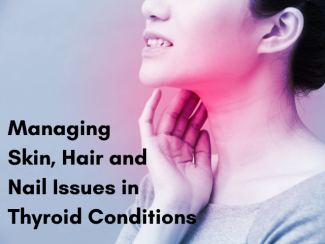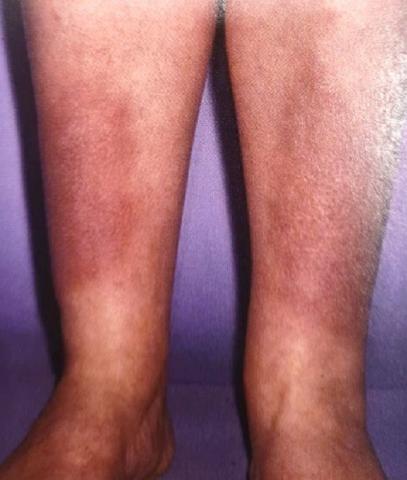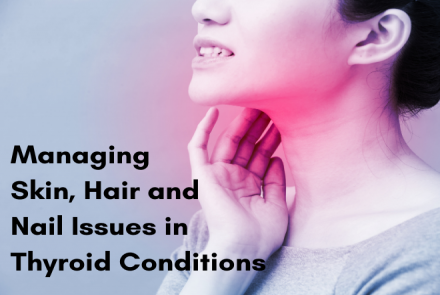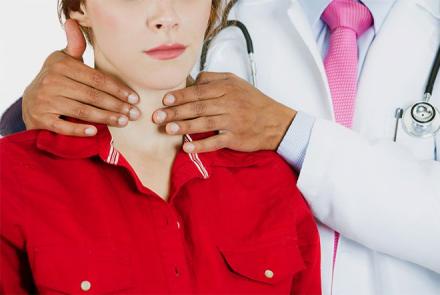
Dermatologist Dr. Kruti Banodkar explains how hypothyroidism and hyperthyroidism affects the skin, hair and nails of a person, the home remedies and self care strategies for the dermatological issues and when you should see a physician.
The thyroid is a small, butterfly-shaped gland that sits at the front of the neck. It releases hormones to help the body regulate and use energy. It regulates the rate at which calories are burned, affecting weight loss or weight gain. It can slow down or speed up the heartbeat. Without the right amount of thyroid hormones, the body’s natural functions begin to slow down.
Healthy skin is influenced by hormones, and specifically depends on the thyroid hormone for healthy skin and good hair growth. When thyroid function is altered, the skin can't function well.
Thyroid disorders are classified into two types: -
Hypothyroidism occurs when the body doesn’t produce enough thyroid hormones. Over time, untreated hypothyroidism can cause a number of health problems, such as obesity, joint pain, infertility and heart disease.
Hyperthyroidism (overactive thyroid) occurs when the thyroid gland produces too much of the hormone thyroxine. Hyperthyroidism can accelerate the body's metabolism, causing unintentional weight loss, a rapid or irregular heartbeat.
Thyroid disorders are known to involve all the organ systems of the body and the skin is no exception. Both hypothyroidism and hyperthyroidism are known to cause skin and hair changes.
What is the relationship between thyroid hormones and dermatology?
The thyroid hormone plays a pivotal role in embryonic development of skin as well as in maintenance of normal function an adult skin. It is necessary for the initiation and maintenance of hair growth and normal secretion of sebum. Overactivity and underactivity of the thyroid gland may result in alterations in skin, hair or the nails.
Although the thyroid gland sits deep in the neck, a dermatologist may be the first doctor to notice signs of thyroid disease.
What are the clinical signs and symptoms of hypothyroidism?
Hypothyroidism refers to thyroid hormone deficiency. It causes changes in the skin, hair, nail and sweat gland secretion.
Skin changes: -
- Pale, thin, wrinkled skin
- Due to reduced sweating, palms and soles can become thick, dry, scaly with deep cracks
- Excessive dryness of skin esp. on extensor surfaces
- Cold skin at the peripheries.
- Myxoedema- The most common skin change is puffiness or swelling due to a build-up of fluid in deep layer of the skin (dermis), which can lead to swollen lips, tongue, hands, legs, face and eyelids.
- Yellowish discolouration of skin on the palms and soles
- Cold intolerance
- Poor wound healing tendency
- Bruising
- Goitre
Hair changes: -
- Diminished body hair.
- Slow growing, dry, brittle coarse scalp hair
- Loss of lateral third of eyebrows
- Pubic and axillary hair also may be sparse.
- Hair loss on the scalp
- Increased complaints of hair fall
Nail changes: -
- Atrophy of nails
- Coarse, dry, brittle nails
- Slow growth of the nails
What are the clinical signs and symptoms of hyperthyroidism?
Skin changes: -
- Warm skin
- Heat intolerance
- Increased sweating (hyperhidrosis), especially on palms and soles may be observed.
- Hyperpigmentation in the creases of your palms, on your gums, or elsewhere in the mouth
- Redness on the palms
- Telangiectasia
- Warm, moist, soft, velvety, and smooth skin
- Facial flushing
- Itching all over the body
- Localized thickening of the pretibial skin - pretibial myxoedema (see figure 1.)
- Tender, red-brown nodules occur on areas such as the shins, calves and feet.
- Digital clubbing and swelling
- Redness of the elbows
- Goitre
- Protruding eyes(exophthalmos)

Hair Changes: -
- Fine, soft hair
- Diffuse non-scarring form of hair loss
- Early greying of hair
Nail changes: -
- Plummer's nails: this is characterized by a concave contouring which raises the nails away from the nail bed.
- distal onycholysis with hyperpigmentation.
How can a patient manage these symptoms? What treatment options and home remedies are available? When should one see a doctor?
If any of the above changes are noted in the skin and hair, it would be best to talk to a doctor about the possibility of thyroid dysfunction. An early diagnosis of thyroid disorders can help in prevention of a lot of morbidity associated with it.
Testing is simple and results are available fairly quickly. Effective treatment options are available. Often over many weeks or months of treatment, a steady improvement is seen in the appearance of skin, hair and nails. While waiting for the thyroid hormone levels to normalize, these are some measures that will help to combat some of the more common symptoms at home: -
Dry Skin and Scalp
- MOISTURIZE the skin often.
- Moisturizers have to be used liberally three to four times a day all over the body
- No oil massages.
- Hydrate, hydrate, hydrate. Intake of at least 2- 3 litres of water will play a great role in keeping the skin hydrated adequately.
- Bathing only once a day will help in controlling the dryness of the skin. Preferably no showers. Bucket bath is preferable.
- Using hot water in the shower or bath removes the natural skin oils. A lukewarm water bath is preferable.
- No rubbing the skin vigorously dry after bath.
- Moisturizing directly after showering or bathing and applying the moisturizer while your skin is still damp is very helpful.
- Using gentle, fragrance-free cleansers and shampoos that moisturize, and avoiding products that contain alcohol, such as hand sanitizer will help in preventing skin and scalp from drying out too fast.
- Its best to avoid alcohol and caffeine, which tend to dehydrate the skin.
Edema
- It is helpful to maintain a healthy diet. Eating lots of fruits, vegetables, nuts and whole grains is advisable.
- It is important to avoid caffeine and alcohol, which can contribute to swelling.
- The salt intake should be restricted. It is important to minimize processed foods, canned foods and frozen foods, which contain a lot of sodium.
- Physical activity should be included in the daily routine.
Brittle, Thick Nails
- Moisturizing feet and nails regularly, especially on damp skin after bathing will be very beneficial. Petroleum jelly, lanolin moisturizers, coconut oil, olive oil, jojoba oil and almond oil are also good options.
- Fingernails and toenails should be clean and trimmed well to avoid fungal infection, which can make nails brittle.
- Its best to take a break from nail polish and regular manicures and pedicures, where hands and feet are soaked in water and are more prone to brittleness.
Hair Loss
Often rapid hair loss (body and scalp) can be one of the hardest symptoms to deal with. Some people notice small or large amounts of hair falling out in the shower or sink, or changes in texture, making it dry, coarse or easily tangled.
- Its best to consult a dermatologist who can help with hair fall by treating it appropriately with proper supplements and thyroid medicines.
High levels of iodine consumption can exacerbate hyperthyroidism, so it’s a good idea to watch the iodine intake. Limiting iodine in the diet by restricting consumption of foods such as: fish, seaweed, shrimp, dairy products, and grain products (like cereal and bread) will be very helpful.
What is your advice to thyroid patients for hair, nail and skin care on a daily basis?
The first and foremost advice to all patients with thyroid diseases is to maintain a regular skin care and hair care routine. Any symptoms related to skin, hair or nail should be addressed at the earliest even with some simple measures at home.
Though home care measures will surely help, it would be best to take the thyroid medicines regularly as directed by the doctor.
Daily application of a moisturizer containing ceramides will go a long way in treating the dryness of the skin, the applications can be thrice a day for optimum benefits.
Also itching of the skin should be treated with antihistamines which will give some relief. In case of excessive sweating over palms and soles, medical advice should be sought if it is hampering routine activities. Oiling of hair will help to control the dryness and the fizziness of the hair. Intake of a balanced diet rich in proteins, iron, calcium and vitamins will help in controlling hairfall.
What effect do the seasons and change in weather have?
Winters will affect patients of hypothyroidism in a big way as their symptoms aggravate due to the dry, cold weather – the dryness of skin increases, palms and soles may have deep cracks. Since hypothyroidism slows down the metabolism, it makes one more sensitive to cold temperatures.
Summers adversely affect patients of hyperthyroidism as it aggravates sweating, irritability, intolerance to heat etc.
Any tips on managing thyroid during winter months?
In case of hypothyroidism - Moisturizer thrice a day, woollens since there is cold intolerance, treat the excessive dry scaly thick skin on palms and soles regularly with hand and foot creams daily at bedtime. Using a humidifier at home to keep the air moist will be helpful. Limited bath time will be helpful.
What are dermatology complications that one should watch out for?
It is important to watch out for warning signs that the body gives by causing skin and hair changes such as:-
Changes in Hyperthyroid patients:
- Hyperpigmentation (dark discolouration) of skin
- Excessive sweating of palms and soles.
- Redness of palms
Changes in Hyporthyroid patients:
- Hairfall with thinning of hair
- Loss of lateral third of eyebrows
- Dry, cold, pale skin
- Swelling of face, eyelids, lips, tongue which is persistent.
- Yellowish discolouration of palms and soles
- Bruising
- Slow wound healing
Dr. Kruti Banodkar, is a well known Dermatologist, Trichologist & Cosmetic Dermatologist. She has an experience of 10 years in treating patients of all age groups with skin, hair, nail and aesthetic concerns.
She is the medical director & founder of Skin Crest Clinic, Mumbai. She is also attached to the K J Somaiya Superspeciality Hospital, Sion & Cumballa Hospital, Kemps Corner.

















